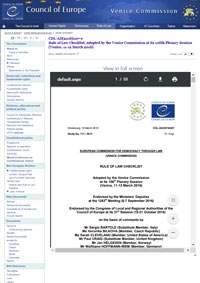
The Venice Commission adopted the Rule of Law Checklist. The Checklist aims to enable an objective, thorough, transparent and equal assessment of the respect of the Rule of Law in a given country. Actors wishing to assess the respect of the Rule of Law in a country now have a reliable tool for doing so. This includes parliaments and other State authorities, civil society and international organisations.
For more information please
visit the site
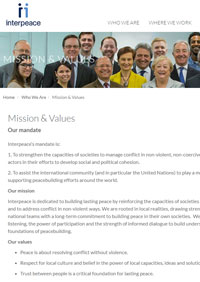
The goal of Interpeace’s Constitution-Making for Peace Programme is to support constitution-making processes that leads to a more durable peace. The programme promotes the principles of local ownership, inclusion, gender equality, participation and transparency. The programme highlights options for the constitution-making process so that the process contributes to national dialogue, consensus-building, greater social and political cohesion, conflict management, reconciliation and the strengthening of democratic principles, institutions and the rule of law.
For more information please
visit the site
.jpg)
The International Institute for Democracy and Electoral Assistance (International IDEA) is an intergovernmental organization that supports sustainable democracy worldwide. International IDEA’s mission is to support sustainable democratic change by providing comparative knowledge, and assisting in democratic reform, and influencing policies and politics.
For more information please
visit the site
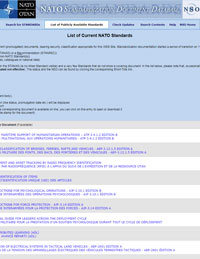
This is a database containing an extract from the NATO Standardization Document Database (NSDD) showing only the current (promulgated) documents. The NATO Standardization Office (NSO) is an independent NATO Office that reports to the Committee for Standardization (CS) Policy and Management and to the Military Committee (MC) for corporate oversight and issues relating to operational standardization. The mission of the NSO is to provide Standardization Management for NATO. Standardization Management encompasses in particular standardization policy; harmonization of NATO standardization activities; rules and regulations for development, ratification, promulgation, and support to implementation of standardization products; standardization management support to Tasking Authorities; terminology policy and guidelines, cooperation with civilian standardization bodies; publishing of NATO standards and standardization promotion.
For more information please
visit the site

The toolkit contains a number of booklets that provide norms and standards, guidebooks as well as practical examples of model laws in various areas of security sector legislation. This toolkit is primarily addressed to all those who intend to create new or develop existing security sector legislation. This includes parliamentarians, civil servants, legal experts and nongovernmental organisations. The toolkit may also be helpful to security officials and, as a reference tool, to researchers and students interested in security sector legislation.
For more information please
visit the site
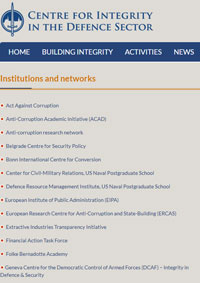
Centre for Integrity in the Defence Sector is a great resource for Building Integrity in Defence topics. Based in Norway, this organisation specialises in a variety of knowledge products from courses to publications, which can be found on their website. The CIDS website resource section can be of special value to those seeking a quick overview of key knowledge sources on this subject.
For more information please
visit the site
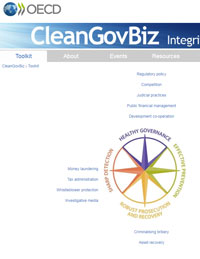
The Toolkit offers practical guidance on how corruption can best be tackled in multiple domains. This toolkit draws together relevant instruments to support the establishment of healthy systems of governance, prevent corrupt practices, detect corruption, prosecute delinquencies and remedy the consequences of corruption.
For each policy area contributing to the fight against corruption, users are provided with:
- Priority checklists
- Implementation guidance with examples of good practices
- Access to existing relevant standards and instruments, guides and manuals, case studies and reviews elaborated by international and civil society organisations
For more information please
visit the site
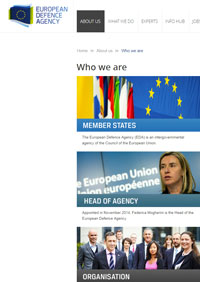
This is a tool that allows open and competitive bidding in defence procurement. The Gateway is held by the European Defence Agency. This tool contributes to the integrity of the decision making process in procurement by making it more transparent.
The tool enables Ministries of Defence in the subscribing Member States to publicise transparently their defence contract opportunities on a single European defence business portal; provides European defence-related companies an equal window of opportunity for accessing defence contract opportunities; encourages transparency and strengthens competition, laying the foundation for the development of the European Defence Equipment Market (EDEM).
For more information please
visit the site
.jpg)
The European Partners against Corruption (EPAC) is an independent, informal network bringing together more than 60 anti-corruption authorities and police oversight bodies from Council of Europe Member Countries. EPAC offers a medium for practitioners to share experiences, identify opportunities, and cooperate across national borders in developing common strategies and high professional standards.
For more information please
visit the site
.jpg)
The Financial Action Task Force (FATF) is an inter-governmental body established in 1989 by the Ministers of its Member jurisdictions. The objectives of the FATF are to set standards and promote effective implementation of legal, regulatory and operational measures for combating money laundering, terrorist financing and other related threats to the integrity of the international financial system. The FATF is therefore a “policy-making body” which works to generate the necessary political will to bring about national legislative and regulatory reforms in these areas.
For more information please
visit the site
Page 3 of 7



